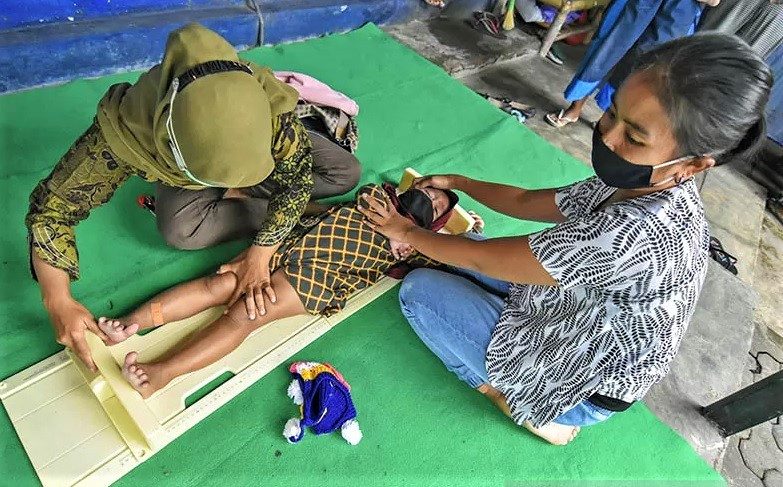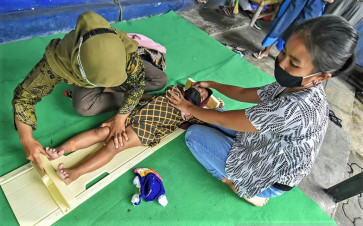Popular Reads
Top Results
Can't find what you're looking for?
View all search resultsPopular Reads
Top Results
Can't find what you're looking for?
View all search resultsStunting: Lessons learned and the way forward
Further reducing the stunting rate would require local leaders and communities to innovate.
Change text size
Gift Premium Articles
to Anyone
 Aiming high: Health community center (Puskesmas) volunteers measure the height of a child in Kutilang, Ampenan subdistrict, West Nusa Tenggara, on April 8, 2021. Indonesia has reduced the nationwide rate of child stunting from 31 percent in 2018 to 24 percent in 2021, with the aim of further dropping the figure to below 14 percent by 2024. (Antara/Ahmad Subaidi)
Aiming high: Health community center (Puskesmas) volunteers measure the height of a child in Kutilang, Ampenan subdistrict, West Nusa Tenggara, on April 8, 2021. Indonesia has reduced the nationwide rate of child stunting from 31 percent in 2018 to 24 percent in 2021, with the aim of further dropping the figure to below 14 percent by 2024. (Antara/Ahmad Subaidi)
O
ne in four Indonesian children is stunted. Caused by malnutrition, the real problem with stunting is not its impact on height, but rather on a child’s brain development. Stunted children are susceptible to long-term developmental delays and weakened immune systems. The implications on health, academic success and economic opportunities cast a shadow on these children forever.
Despite the global pandemic, and disruption to essential healthcare services and vaccination delivery, Indonesia has managed to reduce its stunting rate from 31 percent in 2018 to 24 percent in 2021. What has gone right and what can we do more of?
While stunting can be prevented, it is a complex issue requiring a multidisciplinary solution and collaboration across different stakeholders. With the launch of the National Strategy to Accelerate Stunting Prevention (StraNas Stunting) in 2017, the government mobilized US$14.6 billion to converge health, nutrition and early-childhood interventions across 23 government ministries and agencies.
Coordinating efforts requires real-time, individualized data; regular surveys; and comprehensive-monitoring systems. Partnering with the World Bank, Tanoto Foundation published a dashboard with key metrics related to the child’s first 1,000 days. This serves as a central database for different organizations and government entities to not only better target and coordinate programs at the household level, but also to replicate and scale up impactful solutions.
The provincial governments play a pivotal role in allocating and approving budgets for health and nutrition initiatives. To better coordinate, harmonize and scale up behavioral-change communication programs across districts and municipalities, we embarked on a project with the United Nations Children’s Fund (UNICEF) to provide technical assistance to provincial governments in this regard.
To further accelerate stunting prevention and reduction, President Joko “Jokowi” Widodo earlier this year appointed the National Population and Planning Agency (BKKBN) to serve as the bridge between all other agencies and ministries, with an aim to fast-track the implementation of government programs on the ground.
Parents play a major role in their children’s health and wellbeing. A combination of equipping parents with research-backed information and public-health campaigns emphasizing the importance of breastfeeding, complementary feeding, good sanitation and hygiene practices and vaccinations have helped reduce stunting.


















